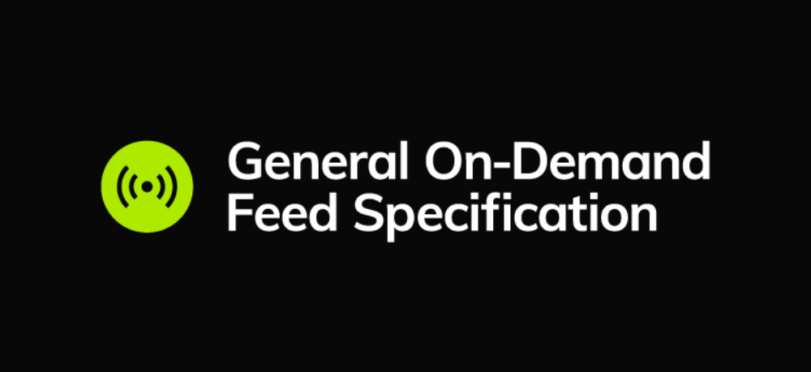GOFS: A New Chapter for On-Demand Transportation Data

We’re pleased to announce that as of today, MobilityData has taken on stewardship of GOFS-lite from the Transit app, and has rebranded it as GOFS.
A lot has happened since the General On-Demand Feed Specification project first launched in 2021, and we are incredibly grateful to everyone who has contributed along the way, including the participants in our initial working group.
Thanks to the work by our friends at Transit, this open specification already has momentum behind it. GOFS is already in use, for example, to show Pace On Demand in suburban Chicago, Freebee on-demand in Miami Beach, and cabs across Montreal via the Montreal Taxi Registry. Data producers include DemandTrans, Ecolane, Freebee, and Pantonium.
“Four years ago, we introduced an open, standardized, lightweight format to share real-time information about demand-responsive transportation,” said Guillaume Campagna, Chief Technology Officer of Transit. “Since then, the effort has grown to include multiple data producers. Transferring stewardship to MobilityData is a natural next step to grow the community of GOFS data producers and consumers, so demand-responsive transportation can become an integral part of multimodal trip planning for even more passengers.”
“Miami Beach was the first city to provide real-time access to Freebee’s on-demand service using GOFS, enabling residents and visitors to plan their trips in the same way they would with fixed-route transit,” said Mikhail Ryabov, P.E., Transportation Manager at the City of Miami Beach. “This early adoption underscored the City’s commitment to innovation and demonstrated how GOFS can bridge the gap between flexible, demand-responsive services and everyday trip planning.”
As the only provider of on-demand public transit in the Chicago region, Pace recognizes the importance of accurate, real-time information for riders. GOFS enables this by ensuring data is open and usable across platforms such as Transit. With MobilityData guiding its future, Pace looks forward to continuing its efforts to build a more convenient and accessible system.
“At DemandTrans Solutions, we are proud to support Pace in delivering real-time On Demand service information through the Transit app using the GOFS standard,” said Todd Voirol, Chief Technology Officer at DemandTrans Solutions. “Producing a GOFS feed has proven straightforward, and the benefits of an open, interoperable data standard for demand-responsive transportation are clear. By making this data easily accessible in navigation apps, riders gain a seamless way to plan demand-responsive trips alongside fixed-route services, enhancing both usability and convenience. We value Transit’s role as the first consumer of GOFS data and strongly support MobilityData’s leadership in advancing GOFS so more agencies, producers, and riders can benefit from open standards.”
“Taxis play an important role in the urban mobility environment, providing a complementary service to public transport,” said Kim Thibault, Senior Planning Advisor at the Agence de mobilité durable de Montréal. “The Registry strengthens the taxi sector by unifying real-time data, supports urban planning with traffic information, and optimizes on-demand mobility tools by standardizing their availability through the GOFS specification. It currently provides real-time geolocation for 3,300 taxis, making them more accessible and competitive in sustainable transport ecosystems.”
Over the past four years we’ve gained valuable experience as we continued to steward open data standards like GTFS, GBFS, and extensions like GTFS-Flex.
One key lesson we’ve learned is that maintaining focused specifications is essential. They streamline development, lower barriers to community contributions, and enhance data usability.
This evolution of GOFS is important because it allows GTFS to remain focused on public transit while ensuring interoperability between the two standards. As a standalone open standard, GOFS provides demand-responsive transportation stakeholders with a simple technology to adopt and a dedicated forum to advance standardization.
What This Means for On-Demand Transportation Data
MobilityData will be encouraging the adoption of and active community participation in both GTFS-Flex and GOFS. Each of these tools are designed to serve specific demand-responsive use cases, providing clarity and efficiency in data exchange. We believe that this approach is a natural evolution that builds on the valuable work of early adopters and the original GOFS Working Group.
GTFS-Flex, for example, shares static data about flexible services, such as deviated fixed-route offerings. GOFS, in contrast, provides real-time information about point-to-point, demand-responsive options like taxi, ridehail, and on-demand transit. For more information about use cases for each standard, check out GOFS.org.
Because we can ensure greater flexibility, targeted development, and more powerful solutions for the entire community with GTFS-Flex and GOFS, we are discouraging further adoption of GTFS-OnDemand.
We want to be clear that this does not mean the work on GTFS-OnDemand is lost. Concepts included in the GTFS-OnDemand proposal can be incrementally added to GOFS as appetite from consumers and producers materializes. We also believe that having GOFS as a standalone standard will create the forum required for consumers and producers to coordinate and accelerate adoption.
How you can get involved:
- Join the conversation in the #GOFS Slack channel.
- Implement GTFS-Flex and/or GOFS per the guidance on GOFS.org.
- Share your implementations: add GTFS-Flex feeds to the Mobility Database and GTFS-Flex tracker, and add GOFS feeds to systems.csv.
- Propose new use cases and improvements by opening Issues on GitHub.
- Consider becoming a MobilityData Member. As a non-profit, we rely on our Membership program to support our work and ensure we can continue stewarding open standards and develop tools for the entire mobility industry.
We’re excited about the possibilities GOFS brings to demand-responsive transportation and eager to build on the progress made so far. Together, with your participation and feedback, we can shape GOFS into the open standard that helps demand-responsive services thrive worldwide. Now is the perfect time to get involved, whether by contributing, implementing, or becoming a member, to help shape the future of on-demand transportation.



